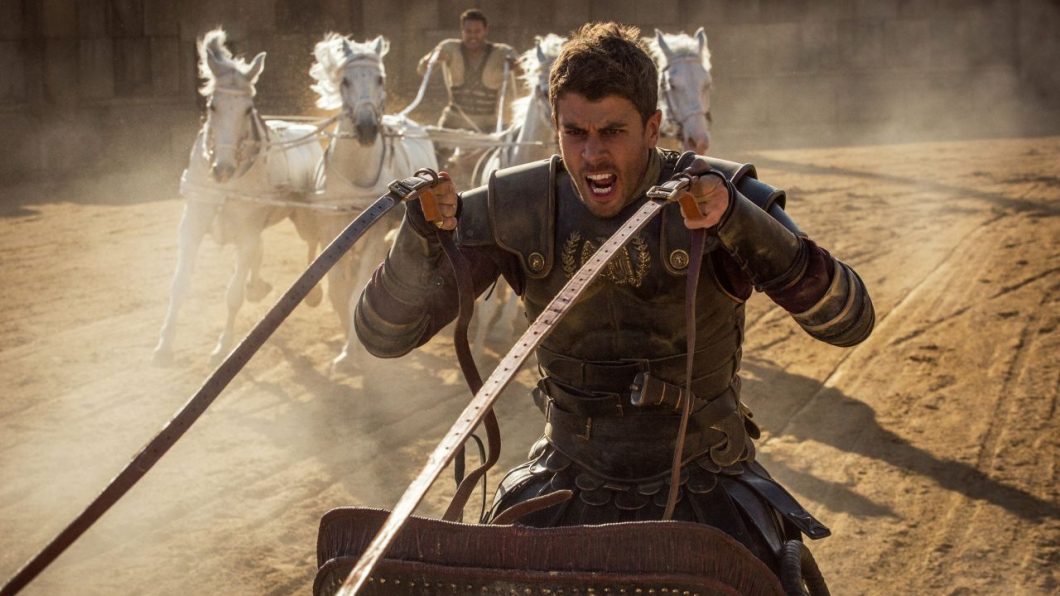Did They Crucify It?
Ben-Hur is basically three films in one. The first is an action-adventure tale. The second is a family drama. And the third is a story of the redemptive power of the love of Christ. It’s an absorbing adaptation of the novel that a former general of the Union army, Lew Wallace, published in 1880, called Ben-Hur: A Tale of the Christ.
Surely one could dislike parts of it, but I don’t think a fair and reasonable critic could pan the entire film. Sequences of it are simply too breathtaking, too awesome, to dismiss, which strongly suggests that the vituperative reviews of Ben-Hur have their source in something other than aesthetic judgment. That other thing, in my opinion, is anti-Christian animus.
But first, the film itself. Judah Ben-Hur (Jack Huston) and Messala Severus (Tony Kebbell) play a Palestinian Jew and his adoptive brother in the year 33 A.D. The brothers are best friends. There’s tension between Rome and the Jews in Jerusalem, and it boils over when religious zealots attack a Roman soldier while hiding in Judah and Messala’s home. Messala, who is adopted and a Roman soldier, demands that Judah turn over those responsible. After taking the blame himself to save his family, Judah is arrested and sent to row in the galley of a slave ship. After five years, he returns, and after a thrilling chariot race against Messala, opts for reconciliation. Judah has been inspired to choose love by his encounter with Jesus of Nazareth, whom he meets intermittently throughout the story and finally witnesses being crucified.
Ben-Hur was directed by Timur Bekmambetov (Wanted, Abraham Lincoln: Vampire Hunter). It was produced by Mark Burnett and Roma Downey, the film producers behind the successful 2013 television series The Bible. Unlike William Wyler’s famous 1959 film adaptation, which only showed Christ briefly and from behind, this one features Jesus speaking in several scenes. The Nazarene (Rodrigo Santoro) is first seen carving wood and overhearing a conversation between Judah and his later-to-be-converted wife, Esther (Nazanin Boniadi). “Love your enemies,” Jesus says. “Love your enemies? That’s very progressive,” Judah responds. These scenes unfold with subtlety and appear very natural, a quality that is lost in the somewhat bombastic final sequences where Judah Ben-Hur finds himself at the foot of the Cross and undergoes a transformation.
The actors are all excellent, from veteran Morgan Freeman, playing a gypsy leader, to the soulful lead Huston, to Kebbell’s Messala, who simmers with the desire to restore his name because his father was involved in the assassination of Julius Caesar. The action scenes are thrilling, and in fact the real standout isn’t the chariot race—an iconic piece of celluloid in the 1959 version—but the battle at sea, when Ben-Hur is a shackled rower below decks. Director Bekmambetov keeps us inside the ship, with only glimpses out a porthole window of what’s going on outside. It’s by far the best part of the movie, the water-drenched confusion finally exploding in a specular side-on collision. It’s an entirely fresh take on a battle scene.
So Ben-Hur is an exciting, big budget ($100 million) summer movie—not the best film ever made, but plenty entertaining. Yet you’d never know that from some of the reviews. Todd McCarthy of the Hollywood Reporter begins this way:
What’s the point of making a cut-rate version of Ben-Hur? Of creating a chariot race so heavily digitized and over-edited that it’s the worst scene in the picture? Of casting lightweights in the leading roles? Of laying a wailing modern pop song over the end credits? Since its birth as a novel 136 years ago, Lew Wallace’s grand melodrama of a Jewish prince whose life intersects with that of Jesus under Roman rule in Judea has always been a Grand Event — as a best-selling book, a stage spectacle that toured for decades and two spectacular film blockbusters, silent and sound. Misguided, diminished and dismally done in every way, this late-summer afterthought will richly earn the distinction of becoming the first Ben-Hur in any form to flop.
This hyperventilating is so over-the-top (dismal in every way?) that one suspects something else is going on. It doesn’t help that McCarthy gave a rave review to Star Wars: The Force Awakens, a film that, unlike Ben-Hur, is truly absurd and unoriginal.
Then there’s Peter Travers in Rolling Stone:
The actors rarely rise above the level of monotonous, and that includes Morgan Freeman as an African sheik who sells horses for chariot races. To be fair, you can see a glint of mischief in Freeman’s eyes. But the movie soon blots out any hint of fun, ferocity or imagination. Ben-Hur wants to preach, brother, preach, but it lacks the essential quality to do that effectively: soul.
Travers doesn’t seem to mind a bit of liberal preaching, as he offered fervent hosannas to Michael Moore’s Where to Invade Next (2015), a high Mass of liberal clichés.
Even with a Christ who preaches love and a final message of reconciliation rather than revenge, the new Ben-Hur is not enough to placate the guardians of liberal orthodoxy.
A week before Ben-Hur opened, I spoke with producers Burnett and Downey as part of their press junket for the film. I brought up the anti-Christian anger that has emerged in so many places in the modern world, from the Middle East and France to our own backyard, where Christian bakers and florists risk losing their businesses in the face of litigation brought by gay rights activists. Burnett and Downey said that they are fortunate to have been so successful, from Burnett’s reality shows like Survivor and Shark Tank to the couple’s series, The Bible. But as Ben-Hur struggles at the box office, it’s possible that their success may have shielded Burnett and Downey from the friction of the culture wars—from the confrontations that are very much present in the minds of most contemporary Christians, and that also make for compelling drama.
That’s why Mel Gibson’s seminal The Passion of the Christ (2004), which made no bones about the reality of evil, was a sensation, and it’s why a small film like God’s Not Dead (2014) made $70 million on a $2 million budget.

